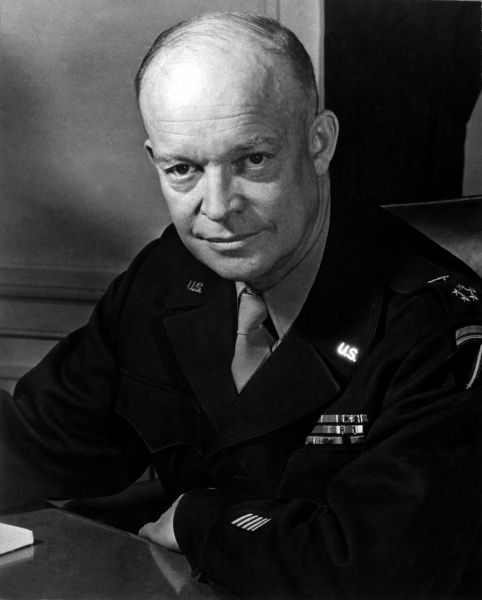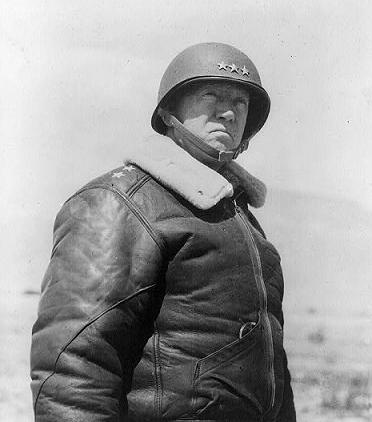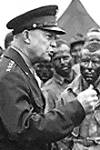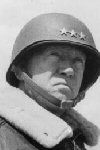Eisenhower: the Man Behind the Name
The War Illustrated, Volume 9, No. 210, Page 142, July 6, 1945.
One year ago this great American led that mighty Allied venture, the seal on which was set with the Unconditional Surrender of Germany. In command of 5,000,000 troops, he has achieved almost overwhelming fame and popularity. “He has walked right into the history books”, says RALPH McCARTHY, who in this appreciation reveals something of the man himself.
June 6 is for ever bright in the story of Britain. One year ago on that day – D Day – the Allied armies stormed on to the shores of Normandy, and the people of this land held their breath.
Do you remember that morning? How men in buses and trains called out: “Have you heard? It's started!” How people exchanged the latest news, queued up for newspapers, hastened to the radio. How the sun seemed to shine with a peculiar brilliance. How silent it seemed here in Britain, despite the squadrons of planes incessantly in the sky. How the thoughts of all were across the strip of Channel, with the men daring the barricades of the beaches.
It was for British people the greatest day of the war, Dunkirk was avenged. And it had been avenged from Britain. From the shores of the homeland the Allied troops had set sail to Normandy on their way to Germany. Should there be any question of a Memorial Day for the Second Great War, as November 11 was chosen for the First Great War, the people of Britain would choose, not May 8, V Day, but June 6, D Day, as the day of memory.
He Conceals His Own Greatness
How well that expedition fared can be judged today. Before a year had passed the last battle had been won and Europe wrenched from the Nazi grasp. But though this is Britain's day, the British people know that it was an Allied venture, that American troops fought and died on June 6, that the army of liberation were really brothers-in-arms, that they came from Pasadena as well as Paisley, from Nebraska as well as Norfolk.
And of this day it is fitting to pay tribute to the one man who more than any other individual made that success possible – one of the really great men of the war – one who, because of his own avowed policy of hiding his greatness, has not received the credit which he deserves: to General Dwight D. Eisenhower, Supreme Commander of the Allied Expeditionary Force.
Now that it is all over we can step back and look at him and his achievements. Really they are remarkable. He has walked right into the history books, and his place is permanent. Because, too, his task of winning battles is done we can disobey his request and tell something about him, something that reveals Eisenhower the man. There are two stories that I particularly like.
The first one happened a few weeks after the Allied landings in North Africa. The fighting was hard and bitter. The American Army was in battle for the first time. Back in the United States the newspapers and radio networks told flamboyant stories of American achievement, until one day Eisenhower sent for the U.S. war correspondents.
“Listen, boys, you're making a mistake. Most of the fighting is being done by the British. Give them the credit. Our troops are new to this war. They'll learn – as the British had to learn.”
The result was that U.S. newspapers, while naturally continuing to give considerable space to the actions of their own men, did tell their readers of the feats of British troops. Later events justified Eisenhower's faith in his men; America will remember Bastogne with Bunker Hill.
The second story is more recent. Before the war a woman, who is British, married in Southern France a stateless Russian. On the collapse of France she escaped home to London; her husband remained. He fought with the Maquis and, in the liberation battles, fought in American uniform with the U.S. troops. He was badly wounded. He was taken to an American hospital, but he had no identity tab, no papers; officially he did not exist. His young wife made every effort to get him to Britain, but all failed. Finally she wrote to Eisenhower.
A few days later she had a reply; the letter expressed sympathy, told her that investigation was being made and, if the facts were true, action would be taken. It was signed “Dwight D. Eisenhower”. The next day her phone rang; a pleasant American voice said: “I'm speaking for General Eisenhower. Gen. Eisenhower wants you not to worry. Just that, not to worry.” The husband is now in a hospital in Britain.
What is remarkable about that story is not the big-heartedness of the man, but the fact that Eisenhower, in command of 5,000,000 troops, is surrounded by no barrier of officialdom. His system allows him to see everything, listen to everyone. Other facts about Eisenhower are already known; he is 54, one of six sons of hard-working parents. He is descended from a family which left Germany in the seventeenth century as a protest against religious persecution.
Personal Reply to a Grievance
His army career has been achieved without influence; in 1941 he was a colonel with a reputation as a “brain” and military organizer. He is unconventional and direct; he swears; in peacetime he plays golf and bridge. He is married and has one son. But there is something else; he avoids publicity. He is one of the few men who really mean it when he says he wants to be ignored.
When American troops flooded into Britain in preparation for the invasion, a British citizen who thought he had a grievance wrote to the U.S. authorities. The reply was a charming letter rectifying matters signed “Dwight D. Eisenhower”. A Fleet Street editor wanted to publish the correspondence to clear the atmosphere of this island, overcrowded with British and American troops. Again Eisenhower wrote, “Please, my policy is no personal publicity”.
Instead he has turned the limelight on his brilliant lieutenants – on Montgomery, beloved by Britain, on Bradley, on Patton and, especially, on his troops in the ranks, the Tommies and G.I. Joes. But never on himself. This is wrong. For long the talk has been: “Of course, Eisenhower is good, but he's not a fighting man. He is the super-managing director of the world's biggest enterprise.” That is untrue.
Not until the war had almost ended did we learn how good a soldier he was, of the important part he played in the strategy of the battles of victory. Indeed, the astonishing manoeuvre which surrounded and broke up the whole Ruhr defence area has been revealed to have been Eisenhower's own plan.
In all ways he is a big man. Today the people of Britain honour him. They recall with gratitude that it was he who decided on June 6 as D Day; it was he who led the liberating armies on to victory.
Index
Previous article
Now It Can Be Told! - How Britain's Gold was Shipped Abroad
The greatest gamble the world has ever known was brought off under the noses of the Germans when, in 1940, Britain's entire gold reserve was moved out of this country. It was totally mobilized for tot
Next article
Facts Behind the Syria-and-Lebanon Dispute
With the cease fire order to French troops there ended on May 31, 1945, a grave situation in Syria and the Lebanon involving heavy casualties and damage to property., and including the shelling by







